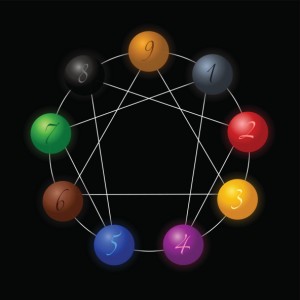Enneagram
 The enneagram is a personality typing model that has been used since ancient times. The word enneagram, which has Greek roots, refers to a nine-pointed symbol, and the model itself posits that all individuals can be categorized into one of nine personality types.
The enneagram is a personality typing model that has been used since ancient times. The word enneagram, which has Greek roots, refers to a nine-pointed symbol, and the model itself posits that all individuals can be categorized into one of nine personality types.
History of the Enneagram
The enneagram was originally rooted in Sufism, a type of Islamic mysticism. According to this tradition, human life involves a journey toward wholeness. Although the enneagram has spiritual origins, it is not a religious symbol.
- The Russian philosopher Gurdjieff brought the concept of the enneagram to Western civilization in the early 1900s.
- In the 1950s, a Chilean psychiatrist named Ichazo linked the enneagram to Pythagorean mathematics, thus making the enneagram more accessible to Western culture.
- The ennegram’s incorporation into modern personality psychology in the 1990s led to its increased popularity in the United States.
The Nine Personality Types
The enneagram symbol displays the numbers one through nine, each of which is attributed to one personality type. No personality type is considered to be inherently “better” than the others, and some believe that one’s personality type may be genetically determined or already decided at the time of one’s birth.
The specific names given to each type vary slightly in the literature, but the characteristics of each type remain largely the same throughout descriptions of the system:
- The Paragon/Perfectionist: This person is generally conscientious, orderly, and very principled. The Paragon, also known as the Reformer, may be wise and accomplish tasks quickly and thoroughly. However, the Paragon might also have perfectionistic tendencies and be critical, both of the self and of others.
- The Helper: This type of person is likely to be empathic, understanding, and warm. A Helper values acts that involve helping and caring for others and is likely to be giving and unselfish. Some individuals with this personality type may tend to place the needs of others before their own.
- The Achiever/Performer: A person with this personality type may feel pressure to stay busy and focus on achievement. Attributes might include efficiency, ambition, and determination. An Achiever may be challenged by competitiveness, lack of work/life balance, and a strong desire for validation.
- The Individualist: A person with this personality type may feel unique and different, seek emotional depth from relationships with others, and is likely to be creative and sensitive. However, those considered to be Individualists might also experience periods of moodiness and self-indulgence and may at times find it difficult to accept things that are seen as ordinary or mundane.
- The Investigator/Observer: An Investigator/Observer may be described as perceptive, curious, and interested in knowing more. While Investigators might be described as visionaries or said to be ahead of their time, they might also come across as intense, withdrawn, and uncompromising.
- The Guardian/Loyalist: The Guardian strives to feel safe. They may frequently anticipate problems and develop effective methods of problem-solving. Individuals with this personality type are often thought to be responsible and trustworthy. They may also be described by others as cautious, suspicious, or insecure.
- The Enthusiast/Dilettante: This type of person might be described as spontaneous and adventure-seeking. Others may think of an Enthusiast as optimistic and exciting. However, an Enthusiast might also be impulsive, impatient, and positive to the extent of denial when considering the possibility of a negative outcome.
- The Challenger/Controller: Those with a Challenger personality type are often considered to be assertive and powerful and may find it easy to lead others and take control of the surrounding environment. These qualities can be used to benefit others, especially because they may often be used to stand up for those in need, but they might be seen as domineering and intimidating to some.
- The Peacemaker: Peacemakers tend to be easygoing, accepting, and supportive of others. While they are often agreeable and may be good at bringing people together, those with this personality type generally avoid conflict and might go along with others too easily, which may make it difficult for them to address problems realistically.
Criticism of the Enneagram
Research attempting to develop consistently valid and reliable scales for the nine personality types has yielded mixed results, and empirical validation of the system’s use as a measure of personality is limited. The nine personality types of the enneagram are not associated with any specific psychological personality theory, and in some instances, the enneagram has been viewed as a way to label and stereotype people. Because people are complex, many feel that it may be overly simplistic to label an individual as a specific “type.”
However, proponents of the enneagram generally do not assign individuals a specific type but typically consider multiple factors in the assessment of personality. They also believe people have the ability to move among types and consider all of the different personality types to be interconnected.
References:
-
Berkers, E. (2003). Introduction to the Enneagram. Retrieved from http://www.eclecticenergies.com/enneagram/introduction.php
- Bland, A.M. (2010). The enneagram: A review of the empirical and transformational literature. Journal of Humanistic Counseling, Education and Development, 49, 16-31.
- Matise, M. (2007). The enneagram: An innovative approach. Journal of Professional Counseling: Practice, Theory & Research, 35(1), 38-58.
- Newgent, R.A., Parr, P.E., Newman, I., & Higgins, K.K. (2004). The Riso-Hudson enneagram type indicator: Estimates of reliability and validity. Measurement & Evaluation in Counseling & Development, 36(4), 226-237.
Last Updated: 11-3-2015
Sorry, the comment form is closed at this time.



